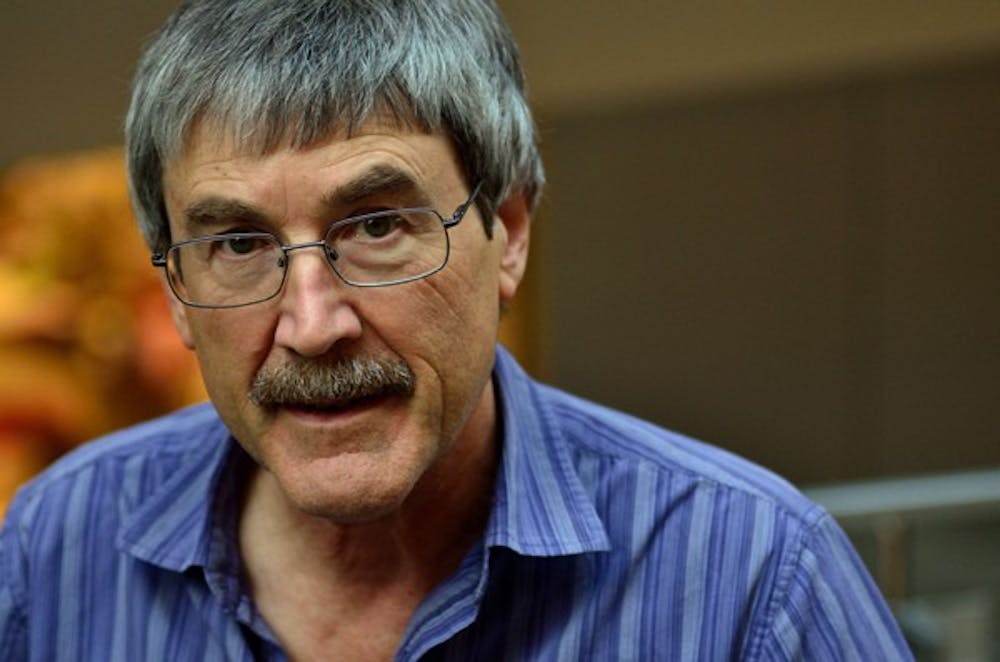Collaborating on the possiblity of a manned mission to Mars, two professors have co-authored and co-edited articles dedicated to space exploration and the possibilities of sending humans to Mars.
Astrobiologists Paul Davies of ASU and Dirk Schulze-Makuch of Washington State University recently collaborated to edit a collection of articles titled “A One Way Mission to Mars: Colonizing the Red Planet.”
The articles provide insight into the feasibility of a manned mission to Mars and call for a renewed spirit of adventure.
Davies and Makuch had previously co-authored “To Boldly Go: A One-Way Human Mission to Mars,” an article which appeared in the October 2010 issue of the Journal of Cosmology, highlighting the necessity for colonization of Earth’s second closest planetary neighbor and outlining the technicalities of such a mission, including landing sites and the construction of colonies.
Makuch said his motivation to collaborate with Davies on this collection was the apparent general apathy toward space exploration in recent years.
“Space exploration moves forward very slowly nowadays and (the colonization of Mars) would be a way to really leap forward again, like during the Apollo era,” Makuch said.
Both Makuch and Davies said the primary reasons we as a species have yet to seriously consider the colonization of Mars are the monetary implications of such an undertaking, as well as an improper political climate.
Davies predicts that if any space agency were to attempt a manned Mars expedition, it will be the China National Space Administration. But he admits that if a manned mission to Mars is to become a reality, it would require global cooperation.
“I pin my hopes on China,” Davies said. “The Chinese still have the discipline and zeal that the U.S. had in the glory days of Apollo and they are ramping up their space program. Actually, it probably needs a consortium of space agencies plus some space privateers to make it happen. I favor a truly global project as a way to unify mankind.”
The cost of such a venture is also a factor behind the sluggish pace of space exploration.
Davies and Makuch cite the proposition of a return trip from Mars as the main reason space agencies have yet to pursue a manned Mars mission in their “To Boldly Go” article.
According to the article, Davies and Makuch said a solution to avoiding a return trip from Mars would be a one-way voyage.
In the article, Davies and Makuch propose a one-way trip to Mars would minimize costs, guarantee continuous commitment to exploring Mars and space, and save years of rehabilitation for returning astronauts.
“It’s too expensive to go to Mars and come back, and it’s not necessary to come back,” Davies said. “By cutting out the return journey, the savings are huge.”
The article also says a journey to Mars would take roughly six months and the foreign climate coupled with the low gravity environment would reduce travelers’ life expectancies to roughly 20 years after the arrival date.
Despite Makuch and Davies’ grim view of the future of space exploration, Michael Braukus, a NASA public affairs officer, said the administration is still actively pursuing the possibility of a manned Mars mission.
“The president first wants to see humans colonize an asteroid by 2025,” Braukus said. “We would then attempt a flyby of Mars by 2035 and establish a human base on the planet shortly thereafter.”
Davies and Makuch said they have faith it wouldn’t be a problem to find pioneers willing to colonize the red planet.
Makuch said if he had the chance to travel on a one-way mission to Mars, he would gladly take the opportunity.
“Although that should not be decided by personal egos, but who is most suitable to bring the project forward with fitting sets of expertise,” Makuch said.
Reach the reporter at doberhau@asu.edu
Click here to subscribe to the daily State Press newsletter.





